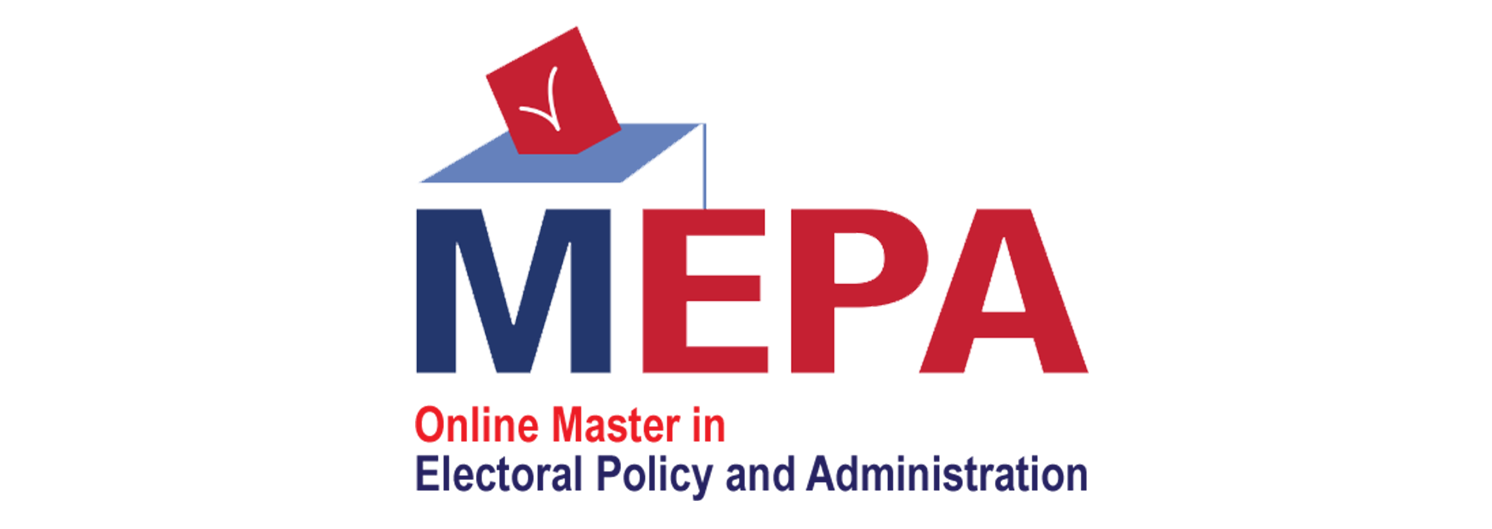Enrollment in the MEPA and/or specific MEPA modules

Phase 1.
- Enrollment in the MEPA and/or specific MEPA modules
The Master in Election and Public Administration (MEPA) with its online curricula will be used as the main tool for capacitating the beneficiaries of this action. MEPA is unique in its kind, as there are currently no other advanced learning programs focusing on electoral policy and administration in the world. It is based on the 2014 IDEA designed “Model Curriculum – Master of Electoral Policy and Administration” and on the concept of the European Commission and the Handbook on Electoral Management Design of the International IDEA. MEPA is hosted on the e-learning platform developed by the United Nations Institute for Training and Research (UNITAR).
This action seeks to reinforce the knowledge and the capacities of the targeted African Electoral Management Bodies – and African Union (AU) by offering to their staff (about 100 people) the possibility to follow 5 Modules of the MEPA and the entire master curriculum (to a limited amount of people). Through the MEPA modules and curricula, the project objective is to build professional electoral administrators knowledgeable and committed to the founding principles of electoral good practice and, able to deliver high-quality electoral service to all stakeholders in their respective countries.
INNOV-ELECTIONS will offer the possibility to attend any of the individual modules of MEPA, to electoral practitioners and administrators in English, Arabic immediately and in French and Portuguese in the context of the translations funded by this project.
The Master Program is composed of 19 modules all available online. The online component last nine months, at the end of which students are required to write a dissertation on a relevant topic of interest. MEPA adopts an approach that highlights the experiential and collaborative learning process. With specific reference to the online component, muddles are designed to foster synergies between theory and practice. The MEPA program is moreover enriched in content and currency, as it relates to election assistance through the ECES’ operational experience and lessons learned from having implemented more than 90 projects in support of democracy and electoral processes in over 45 different countries in the last 11 years.
The 19 Modules composing the MEPA are:
1. Elections and Voting as Instruments of Governance
2. Electoral Legal and Regulatory Frameworks
3. Electoral Management Bodies (EMBs)
4. Electoral Systems and Managing Representation
5. Understanding and Managing Boundary Delimitation
6. Political Parties, Campaigns, and Political Finance
7. Electoral Planning and Budgeting
8. Voter Registration and Identification Systems
9. Electoral Operations
10. Marginalized Electorates and Special Voting Programs
11. Elections and Technology
12. Civic and Voter Education
13. Media and Elections
14. Electoral Integrity and Malpractice
15. Electoral Security and Conflict Prevention
16. Electoral Justice Systems
17. Electoral Observation, Evaluation, and Validation
18. Policy Advice and Electoral Reform
19. Direct Democracy (optional)
Phase 2.
1. Enrollment in specific MEPA modules:
The proposed action in its second phase will seek to reinforce the knowledge and the capacities of targeted African Electoral Management Bodies - and the Regional Electoral Commissions by offering to their staff (about 150-200 persons) the possibility to follow MEPA Individual Modules depending on their specific individual need. During Phase 2 the number of staff benefitting from the capacity building actions on the MEPA modules will be significantly increased.
As for phase 1, the action will continue to use the online MEPA as the main tool for capacitating the beneficiaries of this action.
2. Development of new MEPA modules:
Additional modules will also be developed in strategic areas and will be available in 2021 initially in English. These will focus on the following topics, all based on real training needs especially in the African continent:
· Electoral Logistics
· Elections (and Integrity) in Digital Age
· Elections in Fragile/Post-conflict contexts
· Electoral Violence and Conflict
· International Electoral Assistance
· Managing elections during public health pandemics
· Leadership and Conflict Management Skills for Electoral Stakeholders (LEAD)
3. Organisation of specific MEPA synchronous sessions:
For topics considered of strategic importance, the respective subject matter experts will lead synchronous sessions where they will share with participants the latest developments in the relevant field, will discuss lessons learned and good practices and have an e-presence exchange on the key issues around the thematic area. It is expected that 6 synchronous coaching training will be organised in different moments of the year of reference (2021).

